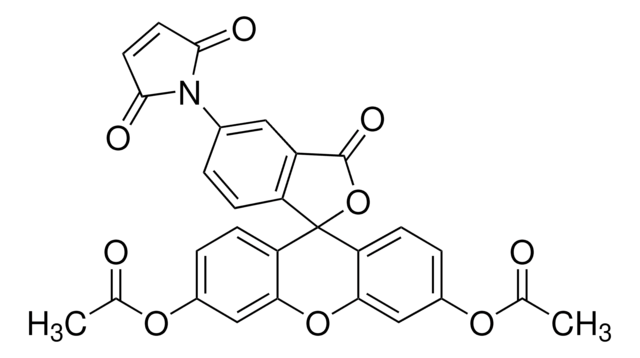MAK151
Fluorometric Thiol Assay Kit
sufficient for 200 fluorometric tests
Synonym(s):
Thiol Fluorescent Assay Kit
Sign Into View Organizational & Contract Pricing
All Photos(2)
About This Item
Recommended Products
usage
sufficient for 200 fluorometric tests
detection method
fluorometric
relevant disease(s)
endocrinological disorders, diabetes; cancer
storage temp.
−20°C
General description
Thiol groups, found as free cysteine, glutathione (GSH), and cysteine residues in proteins, are involved in many biological processes. The disulfide bonds generated when the thiol groups of two cysteine residues are oxidized contribute to the tertiary or quatenary structure of a protein.
Application
Fluorometric Thiol Assay Kit has been used to determine the lipid peroxidation expressed as thiols in samples.
Suitability
This kit is suitable for the detection of thiols in a variety of different biological samples including plasma, urine, and cell extracts. This kit is not optimized for measuring thiol groups in proteins.
Principle
The Fluorometric Thiol Quantitation Kit provides an ultrasensitive assay to quantitate the thiol content of small molecules. The proprietary thiol sensor generates a strongly fluorescent adduct (λex = 490/λem = 520 nm) upon reacting with a thiol-containing compound. In addition, both absorption and emission spectra of the thiol adduct are pH-independent, making this assay kit highly robust. The kit can detect as little as 1 picomole of cysteine or GSH in a 100 μL assay volume (10 nM). The assay can be performed conveniently in either a 96 or 384 multiwell plate format.
Storage Class Code
10 - Combustible liquids
WGK
WGK 3
Certificates of Analysis (COA)
Search for Certificates of Analysis (COA) by entering the products Lot/Batch Number. Lot and Batch Numbers can be found on a product’s label following the words ‘Lot’ or ‘Batch’.
Already Own This Product?
Find documentation for the products that you have recently purchased in the Document Library.
Customers Also Viewed
Judit Eszter Szabó et al.
Scientific reports, 11(1), 19197-19197 (2021-09-30)
Recently it was proposed that the redox status of cysteines acts as a redox switch to regulate both the oligomeric status and the activity of human dUTPase. In a separate report, a human dUTPase point mutation, resulting in a tyrosine
Xiao-Dong Gong et al.
Aging, 13(13), 17568-17591 (2021-07-07)
The homeostasis of the ocular lens is maintained by a microcirculation system propagated through gap junction channels. It is well established that the intercellular communications of the lens become deteriorative during aging. However, the molecular basis for this change in
D Scott Smith et al.
The Science of the total environment, 757, 143648-143648 (2020-12-15)
The Windermere Humic Aqueous Model (WHAM) is often used for risk assessment of metals; WHAM can be used to estimate the potential bioavailability of dissolved metals, where metals complexed to dissolved organic matter (DOM) are expected to be less toxic
Antioxidant Effects of a Hydroxytyrosol-Based Pharmaceutical Formulation on Body Composition, Metabolic State, and Gene Expression: A Randomized Double-Blinded, Placebo-Controlled Crossover Trial.
Colica C, et al.
Oxidative Medicine and Cellular Longevity, 2017, 14-14 (2017)
Ling Wang et al.
Aging, 12(13), 13594-13617 (2020-06-20)
The general transcription factor, CREB has been shown to play an essential role in promoting cell proliferation, neuronal survival and synaptic plasticity in the nervous system. However, its function in stress response remains to be elusive. In the present study
Our team of scientists has experience in all areas of research including Life Science, Material Science, Chemical Synthesis, Chromatography, Analytical and many others.
Contact Technical Service











